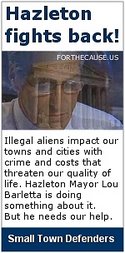
News Elsewhere
Sheriff Arpaio's immigration crusade
Lawman warns: 'You are going to jail' in Maricopa
By Brady McCombs
Arizona Daily Star
Tucson, Arizona | Published: 12.05.2006
When it comes to illegal immigration, no border, no problem. Not for Maricopa County Sheriff Joe Arpaio.
Even though his Central Arizona county doesn't border Mexico, the man who calls himself "America's toughest sheriff" thrust himself into the lead in aggressively fighting illegal immigration last spring.
In March, Arpaio sent a posse of sheriff's deputies and volunteers out to arrest illegal immigrants and smugglers under a new state law that makes smuggling a felony. Using an interpretation from Maricopa County Attorney Andrew Thomas — that the law can be applied to the smuggled illegal entrants themselves — the deputies have made 351 arrests so far, Arpaio said. Two people have been convicted, but the interpretation is being challenged in courts.
"The word is out that when you come through Maricopa County, you are going to jail," Arpaio said. "We don't call ICE (U.S. Immigration and Customs Enforcement) so they can get a free ride back to Mexico. We put them in jail."
Arpaio's approach, however, stands as the exception rather than the rule in the southern half of Arizona. Sheriffs in Pima, Santa Cruz and Yuma counties say they lack the resources to move to the front lines of immigration enforcement, and some say it's simply not their job.
"If we tried to do that, I would use all my resources for that purpose, and I couldn't provide for the safety of this county," said Clarence Dupnik, Pima County sheriff since 1980.
Sheriffs should take some responsibility in immigration enforcement, said Cochise County Sheriff Larry Dever. He initially felt it was a federal problem, but has come to believe he must take some action. But a lack of resources limits what his deputies can do. He said last week that he would consider following Arpaio's example with the right case, just to see what the county attorney would do.
"There is no free ride here if we can help it," Dever said.
Arizona's border counties have been dealing with increasing illegal-immigration problems since the mid-1990s, when enforcement efforts in San Diego and El Paso funneled migrant-smuggling traffic to Arizona. Instead of a smattering of illegal entrants crossing on their own, they began coming in droves, led by smugglers who work for large criminal organizations.
Counties spend significant time and money on a host of illegal-immigrant-related activities. When migrants commit crimes such as car theft or trespassing, deputies must detain and prosecute them. When border crossers are injured, deputies must respond and take them to hospitals. And when they die, deputies must recover their bodies and investigate their deaths.
When deputies encounter illegal entrants in the course of their regular duties, they generally call the U.S. Border Patrol to pick them up. But sometimes they let the migrants go if they don't have time to wait for Border Patrol agents to arrive.
Of the estimated 20 illegal immigrants whom deputies come across each day in Pima County, about half get picked up by the Border Patrol and half are let go because deputies must get back to their patrols, Dupnik said. In Yuma County, where Border Patrol agents respond quickly, illegal entrants are more likely to be deported, Sheriff Ralph Ogden said. In Cochise County, entrants are taken to the nearest Border Patrol station when agents are delayed, Dever said.
The explanations that sheriffs need more resources or that immigration is a federal problem hold little weight with Arpaio, who questions why his colleagues have failed to enforce the new state law. Last week he sent 200 inmates out to pick up trash left in the desert by illegal immigrants. He is currently in negotiations to get as many as 200 deputies cross-certified by Immigration and Customs Enforcement.
"When I get my deputies cross-certified, I guarantee you that these illegals, whether they are in a bar drinking or whatever, they are going to be shook," Arpaio said. "They are going to be afraid, because they see that black and gold car coming by thinking they are going to be arrested."
Reply--
This is how it needs to be in all States!
Wednesday, December 13, 2006
Posted by
Frank Luciano
at
9:23 AM
![]()
Subscribe to:
Comment Feed (RSS)










|